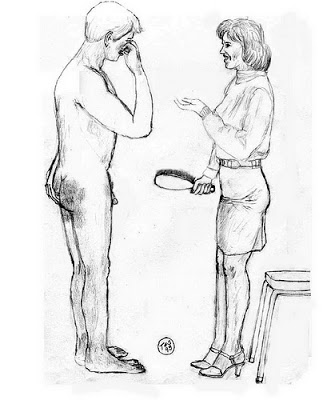“You will not be punished for your anger; you will be punished by your anger.” - Gautama Buddha
Hello all. Welcome back to The Disciplinary Couple’s Club. Our weekly on-line gathering of men and women who are in, or would like to be in, a Domestic Discipline relationship.
Once again, before we get started, I would like to thank the Disciplinary Wives who have recently joined us and to extend an invitation to all others who may be inclined to move from “lurker” to “commenter” status. We like having you around.
I hope you all had a great week. I’ve spent mine recovering and catching up on things after my recent motorcycle trip. Those longer trips tend to stay on my mind, as the style of riding we were doing (adventure motorcycles, aka ADVs) almost always involves some hairy on and off-bike moments, and there were long, long segments on this one where your attention had to be focused all the time, with no real breaks. And, while the riding is fun, it’s also exhausting. It’s a prescription for bringing out my irritability after several days of hard riding and rough sleeping.
Therefore, some recent comments here about irritability and temper were well-timed in providing a basis for this week’s discussion.
A new commenter, George, recounted a recent bout of snippy, attitude-laden behavior:
“I recently had something happen that concerned me enough to wake me in the middle of the night. My wife and I were running an errand at a home store for my sister-in law who cannot get around easily and I simply did not want to be there. Just after we parked and before we went into the store, she turned to me and asked me what I was angry about. I told her I had no idea what she was talking about because I thought I had hidden my inner thoughts pretty well. She came back to me with you always get "that look" when you don't want to be doing something. As we got out of the car I just went quiet and went into the store thinking I had been wronged somehow and did a cold shoulder the whole way through the store. Once we got back out and into the car, she said to me that I embarrassed her she really hates when I'm in that "mood". After a short time, I apologized for acting that way and I didn't mean to upset her. This happens a occasionally especially when I am trying to do something I think is important and she needs my help. Many times, after I snap at her, she will be hurt and things will be very quiet for a day or so until I apologize. I don't apologize immediately because I feel I'm in the right in the moment. Afterward I always find myself apologizing. But, it doesn't feel complete enough.”
I replied that I too sometimes cop an attitude when asked to do things that I don’t want to do or that require me to take my attention away from something I would prefer to be doing. And, his comment about how an apology “doesn’t feel complete enough” really resonated with me. At the very core of my attraction to DD is a need to be held accountable in a way that leaves the other person feeling like they ensured that I was really sorry, preferably to such an extent that I avoid copping a similar attitude in the future.
TG concurred, saying:
“This kind of unreasonable snappishness is the number one thing that I encourage my wife to punish for. It works. I’ve caught myself sometimes with that mood rising and had the thought of the punishment pull me back down before it even gets started.”
TG’s and my comments led George to expand a bit more on how spanking imposes a level of accountability that ends things in a way that feels quite different from merely apologizing, regardless of how sincere the apology might be:
“You have both hit the nail on the head! It's ACCOUNTABILITY that I need. Yes it’s okay that I apologize, and I always do. But, even as I am offering the apology, I am thinking, "Well that was easy." I need to be held accountable so this doesn't keep happening. Because each time it does, it pushes us just a little further apart, and that's the thought that woke me at 3AM. Just like TG says, I should have an immediate consequence for my actions. That's what punishment is all about. From an unpleasant consequence comes the discipline to take a breath, and not snap at a perfectly reasonable request.”
This discussion happened a day after my motorcycle excursion ended, and it felt connected. During last year’s trip, I was in a surly mood for much of it, but I had the excuse that I’d injured myself on the first day and was in a lot of pain throughout. On this trip, my attitude was a lot better until the final day. I was pretty much out of gas (metaphorically) at that point. There was a long but really pretty section that lasted a couple of hours. Then, near the very end of the trip, the route planners threw in a very nasty section that, after a couple of hard falls, spoiled what had been feeling like a great way to end the trip.
I didn’t direct my anger at the person I was riding with, but I made it clear what I thought of the route planners and, generally, threw a short little temper tantrum before starting up that section, then really threw a fit after going down and incurring some (minor) injuries to myself and the bike.
Almost immediately after we got past that section, I started feeling embarrassed and pissed at myself for the way I vented my frustration. Like I said, I don’t think I directed any of it at my riding companion, but I certainly directed it near him, and it all felt pretty juvenile. I went from feeling angry at the group that constructs these routes, to anger at myself for expressing that anger in the way I did.
After the fact, it led to some interesting thoughts about what it would be like to have an empowered traveling companion who might have dropped my pants then and there.
Over the 20+ years of our DD, Anne has never focused on spanking for things like a bad attitude or temper, even when directed at her. Although there may have been others, the only instance I can really think of happened last year, when I got testy over an event she planned with a friend. The details aren’t important, but it led to an exchange the next day that, at the time, felt like a huge move forward in her taking control of our communications. She calmly led me through a series of pointed, cross-examination style questions confirming that I had blown up at her; without any real warning; and, in a situation in which she couldn’t read my mind and had no reason to know how I felt about things. In prosecutor style, she led me to the inevitable admission that, yes, my temper tantrum—whether justified or not—was not an acceptable means of communicating; and, yes, it had been unfair to direct it at her; and, yes, I deserved a spanking for it.
Although I accept at face value TG’s statement that being spanked for snippiness and temper works, the issue I would foresee in my case is that when my temper hits, it hits fast. I’m not a “slow burn” kind of guy, and I’m not confident that I could feel it coming on in time to prevent it, as TG describes.
Yet, I don’t know for sure that the prospect of a hard spanking might not, in fact, give me just enough pause to cut off a bad reaction before it happens. When Anne was stepping things up substantially, I definitely did start watching my actions more closely, including my communications which can tend to snark and sarcasm.
Also, while I do think some personality attributes—like how prone we are to temper flares—are at least somewhat hardwired, that doesn’t mean we don’t have some ability to change some of those traits with real effort. I recently read a book called “Me, But Better", in which the author/journalist engaged in an experiment to try to change her scores on the “Big 5” personality components (openness to new experiences, conscientiousness, extraversion, agreeableness, and neuroticism).
She was somewhat surprised at the extent to which she was able to change some negative behaviors tied to her personality traits and, in the process, change her scores on the relevant personality tests. Of the “Big 5” traits, things like temper flares or, in George’s case, snapping at a reasonable request, probably would fall under “agreeableness”, and the author found that one was, in fact, fairly malleable with diligent effort.
So, while it would be challenging, I think it’s at least possible that Anne could fix some of my temper and moodiness with consistent effort. For things like my flare on this trip, it would require some self-reporting on my part, but I do feel fairly motivated to make some changes in that area, and our new weekly check-in process provides a venue for reporting and discussion.
Why hasn’t Anne focused more on temper and attitude issues? I’m not totally sure, but probably because they don’t happen all that frequently and seldom in her presence. But, I probably do express irritability enough that, if she were truly focused on observing and then dealing with it, plenty of opportunities to address it would arise.
I think it also may be that she has not quite made the mental leap to consistently seeing herself not just as wife who spanks for certain agreed-upon offenses but also as a maternal figure who can and should spank in order to correct things like temper and irritability, which when expressed are basically a form of bad manners that mothers historically would have no problem correcting, including bad manners and poor behavior that don't happen in front of her but come to her attention.
As George suggests, irritability and temper can have a pernicious impact on a relationship. And, expressing temper to people like my riding buddy can, even if not directed toward them, result in a loss of respect or embarrassment.
How about you? Do you get punished for temper, irritability, or bad attitude? What situations are most likely to trigger the problem? How promptly and how diligently is it addressed? Does your wife correct you for it only if it’s something she witnesses? How successful has it been in getting you to think and back down before a temper tantrum occurs or you vent your irritability or bad attitude?































